Results
-
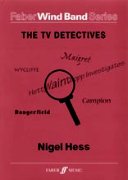 £65.00
£65.00The TV Detectives (Concert Band - Score and Parts) - Hess, Nigel
The TV Detectives brings together five of Nigel Hess's best-known television themes (Dangerfield, Campion, Wycliffe, Maigret and Hetty Wainthropp Investigates), all originally written for small-screen sleuths in whodunits that have been enjoyed by TV audiences worldwide.Dangerfield is a BBC series about a Warwickshire police surgeon, and originally starred Nigel le Vaillant, before Nigel Havers took over the lead role. Campion, also from the BBC, was based on Margery Allingham's stories of a mild-mannered 1920s gentleman detective, played by Peter Davison. Wycliffe was a long-running HTV series set in Cornwall and starred Jack Shepherd as a somewhat dour and low-key DCI - but, of course, he always solved the case! Michael Gambon starred in Granada TV's latest incarnation of the famous French detective Maigret, while Patricia Routledge played the OAP sleuth to perfection in Hetty Wainthropp Investigates, another popular BBC series. For the first time these popular tunes, which conjure up their programmes perfectly, have been arranged for wind band in a continuous suite.Duration: 8.00
Estimated dispatch 7-14 working days
-
 £37.62
£37.62Toucan Tango (Concert Band - Score and Parts)
Another great zoological hit for young bands by Len Orcino. Composed over a traditional tango rhythm, this enchanting little piece will liven up any young band performance and we guarantee your students will love it! Can't Be Beat!
Estimated dispatch 7-14 working days
-
 £58.95
£58.95TWO SONGS WITHOUT WORDS (Concert Band) - Holst, Gustav - Erickson, Frank
Two Songs Without Words was composed in 1906 and was dedicated to Ralph Vaughan Williams and is similar in style to his two suites for band. The Country Song opens with the principal theme as an unaccompanied clarinet solo, followed by its repetition in the full woodwind section. The main theme returns in a "maestoso" setting before fading into a quite closing. Marching Song is characterized by a distinctive running sixteenth note figure. The principal melody, first played by the low woodwinds, is punctuated by these same running sixteenth note fragments. Both themes are again repeated with much variation before the tempo picks up into a short coda-style ending.
Estimated dispatch 7-14 working days
-
 £39.60
£39.60Uncle Buck's Truck (Concert Band - Score and Parts)
Conjuring up visions of the old "Model T" truck, including the hand crank and honking horn, this tune has "cute" written all over it! Using the fundamental notes typically learned in the first semester of instruction, your students will "love" playing "Uncle Buck's Truck" on their first concert. A real "crowd-pleaser."
Estimated dispatch 7-14 working days
-
 £64.95
£64.95WHEREVER YOU ARE (Concert Band) - Mealor, Paul - Stubbs, Duncan
Commissioned by Gareth Malone for Series Four of BBC TV's 'The Choir' and first performed by Malone and The Military Wives Choir as part of The Royal British Legion's Festival of Remembrance at the Royal Albert Hall on 12 November 2011, in the presence of Her Majesty The Queen. The text is taken from poems, letters and prayers written by the Military Wives, selected and adapted by Paul Mealor, and a passage from the Book of John. Selling a staggering 556,000 copies in the week leading up to Christmas, more than the rest of the Top 12 combined, Wherever You Are became the UK's Official Christmas No. 1 of 2011. A brass band version is also available. A contribution from the sales of the sheet music will be donated to the two nominated charities: The Royal British Legion and SSAFA Forces Help.
Estimated dispatch 7-14 working days
-
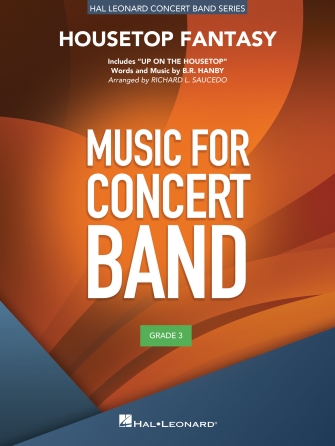 £70.00
£70.00Housetop Fantasy (Concert Band - Score and Parts) - Saucedo, Richard L.
Using the holiday classic ?Up on the Housetop? as a point of departure, Richard Saucedo spins a masterful contemporary setting filled with clever scoring devices and unexpected dramatic moments. This unique and appealing arrangement is sure to become a favorite for winter concerts.
Estimated dispatch 7-14 working days
-
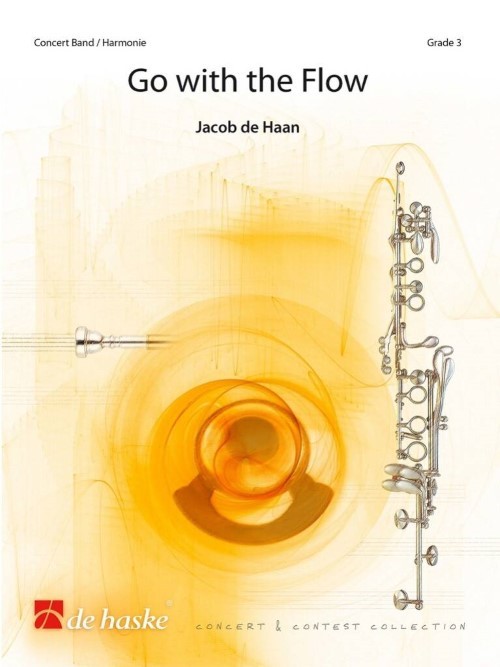 £99.99
£99.99Go with the Flow (Concert Band - Score and Parts) - De Haan, Jacob
This work is not only about the flow of the Doubs, Ranceuse and Roide rivers that converge at Pont-de-Roide but also about the flow of life and history of this French town. The composition begins festively and, after the tempo picks up, the music smoothly and rhythmically depicts the happiness and enthusiasm of the inhabitants. The ever-flowing waters of the rivers introduce the slow, melodic middle section, which suddenly turns into traditional march music. After a return to sounds of happiness and enthusiasm, the work closes majestically.Duration: 9.00
Estimated dispatch 7-14 working days
-
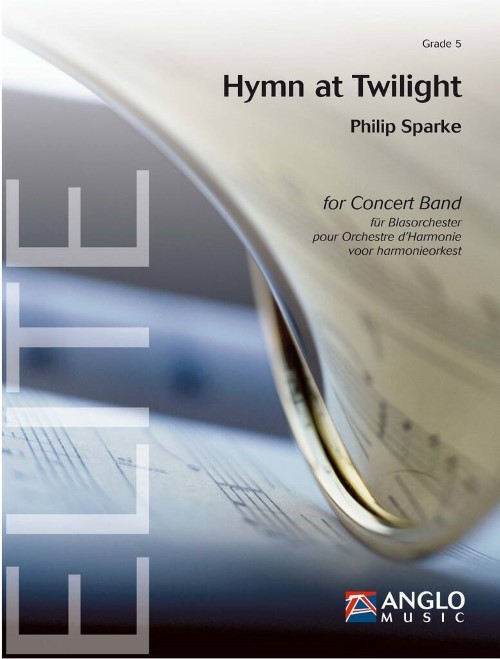 £110.99
£110.99Hymn at Twilight (Concert Band - Score and Parts) - Sparke, Philip
Although specifically describing the uncertainty of approaching night and an evening prayer, Hymn at Twilight is actually about the human emotions of doubt, insecurity, hope and resolve. This solemn piece opens quietly and introduces a recurring four-note rising figure. Optimism, anxiety and resignation alternate, with the flute taking centre stage. Brass and woodwind take up the chorale. The piece ends in a mood of sanguine optimism.Duration: 9.30
Estimated dispatch 7-14 working days
-
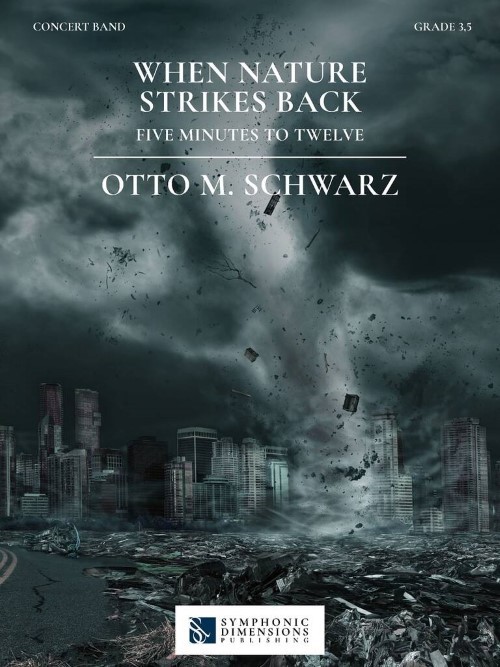 £139.99
£139.99When Nature Strikes Back (Concert Band - Score and Parts) - Schwarz, Otto M.
Ice ages, warm periods, impacts by asteroids - the climate on our planet has always been in a state flux. The difference to the past is that since the industrial revolution, the changes are now also increasingly caused by human activity. The release of greenhouse gases in particular promotes the warming of the atmosphere and the oceans. Some experts even predict an increase of up to 4.8 degrees by the end of the 21st century. The result of such a development, apart from environmental catastrophes that are difficult to predict, would be a gigantic migration of populations. CO2 emissions must be reduced: it is five minutes to twelve. The harbingers of disaster have already reached us.Duration: 8.00
Estimated dispatch 7-14 working days
-
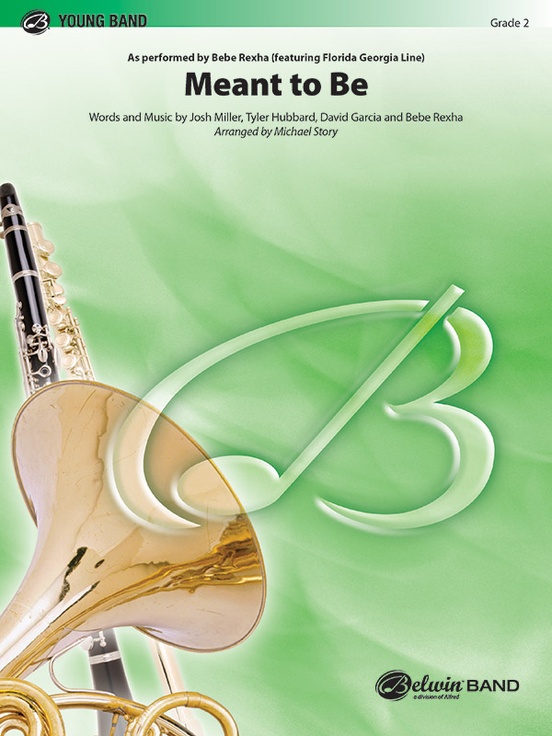 £68.00
£68.00Meant to Be (Concert Band - Score and Parts) - Story, Michael
Pop singer Bebe Rexha teamed up with the country music group Florida Georgia Line to create this number-one hit that crossed numerous pop charts. This arrangement of Meant to Be by Michael Story perfectly captures the feel of the original recording.Duration: 2.00
Estimated dispatch 7-14 working days
